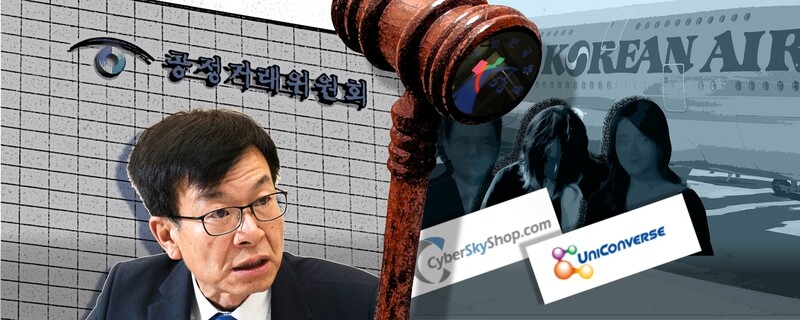hankyoreh
Links to other country sites 다른 나라 사이트 링크
Court throws out ruling against Korean Air in profit funneling case

A court has thrown the brakes on the Fair Trade Commission’s (FTC) efforts to punish profit funneling practices by chaebol-owning families. The decision is raising concerns that the courts are bucking widespread demands from society to strictly regulate profit funneling.
Seoul High Court’s second administrative division ruled for the plaintiff on Sept. 1 in a case filed by Korean Air and its affiliates Cybersky and UniConverse to have an FTC correction order and 1.43 billion won (US$1.27 million) in penalties overturned.
“It is impossible to conclude simply from the evidence submitted by the FTC that the profits returned to Cybersky and UniConverse constituted the furnishing of unfair gains to a conglomerate family as per Article 23-2 in the Fair Trade Act,” the court said in its decision.
Created with an amendment of the Act in 2013, Article 23-2 is the so-called “chaebol family funneling regulation,” barring affiliates in conglomerate groups with 5 trillion won (US$4.45 billion) or more in assets from delivering “unfair gains” to another affiliate in which the family has 30% or larger stake (20% for non-listed companies).
In Nov. 2016, the FTC assessed 1.43 billion won in penalties against Korean Air, charging it with providing unfair gains through favorable transactions with Cybersky and UniConverse, affiliates where most stock in owned by Hanjin Group chairman Cho Yang-ho’s children Heather (Hyun-ah), Walter (Won-tae), and Emily (Hyeon-min). The commission ruled at the time that Korean Air furnished unfair economic gains in transactions with Cybersky – 100% owned by Cho’s children – by funneling online advertising for onboard duty free shops, waiving transaction fees for communication sales, and purchasing promotional items at high prices. It also concluded a call center management contract granted excessive facility usage, maintenance, and repair fees to UniConverse, which is 90% owned by the Cho family.
But the court argued that “unfairness” according to Article 23-2 required a “harmonious interpretation in terms of the concentration of economic power et al.”
“The 37.19 million won (US$33,130) in online advertising revenues provided by Korean Air between Feb. 15 and Nov. 8, 2015, amounted to just 0.5% of Cybersky’s 7.0 billion won (US$6.24 million) in total sales for 2015, while the 152.8 million won (US$136,100) in communications sales transaction fees waived between Jan. 2009 and Mar. 2015 amounted to just 24.45 million won (US$21,780) per year,” the court noted.
“From this scale of transaction, it is impossible to conclude that Korean Air and Cybersky were defrauding private interests and scheming to concentrate economic power,” it ruled.
On Korean Air’s transactions with UniCoverse, the court concluded that it was “impossible to determine that these constituted transactions under substantially beneficial conditions because the system usage fees and maintenance/repair fees cannot be assessed separately in terms of their illegality.”
The FTC said the court’s decision “effectively said that even when unfair gains are provided to a conglomerate family, it cannot be punished unless the amount of gains is large enough to raise concerns about the concentration of economic power.”
“This will pose serious constraints on future regulations against profit funneling by chaebol families,” it worried, adding that it planned to “carefully review the court’s ruling before deciding whether to appeal it with the Supreme Court.”
By Kwack Jung-soo, Business correspondent and Choi Ha-yan, staff reporter
Please direct questions or comments to [english@hani.co.kr]

Editorial・opinion
![[Column] Has Korea, too, crossed the Rubicon on China? [Column] Has Korea, too, crossed the Rubicon on China?](https://flexible.img.hani.co.kr/flexible/normal/500/300/imgdb/original/2024/0419/9317135153409185.jpg) [Column] Has Korea, too, crossed the Rubicon on China?
[Column] Has Korea, too, crossed the Rubicon on China?![[Correspondent’s column] In Japan’s alliance with US, echoes of its past alliances with UK [Correspondent’s column] In Japan’s alliance with US, echoes of its past alliances with UK](https://flexible.img.hani.co.kr/flexible/normal/500/300/imgdb/original/2024/0419/2317135166563519.jpg) [Correspondent’s column] In Japan’s alliance with US, echoes of its past alliances with UK
[Correspondent’s column] In Japan’s alliance with US, echoes of its past alliances with UK- [Editorial] Does Yoon think the Korean public is wrong?
- [Editorial] As it bolsters its alliance with US, Japan must be accountable for past
- [Guest essay] Amending the Constitution is Yoon’s key to leaving office in public’s good graces
- [Editorial] 10 years on, lessons of Sewol tragedy must never be forgotten
- [Column] A death blow to Korea’s prosecutor politics
- [Correspondent’s column] The US and the end of Japanese pacifism
- [Guest essay] How Korea turned its trainee doctors into monsters
- [Guest essay] As someone who helped forge Seoul-Moscow ties, their status today troubles me
Most viewed articles
- 1[Column] The clock is ticking for Korea’s first lady
- 2Samsung barricades office as unionized workers strike for better conditions
- 3S. Korea, Japan reaffirm commitment to strengthening trilateral ties with US
- 4[News analysis] After elections, prosecutorial reform will likely make legislative agenda
- 5[Editorial] When the choice is kids or career, Korea will never overcome birth rate woes
- 6Japan officially says compensation of Korean forced laborers isn’t its responsibility
- 7[Editorial] As it bolsters its alliance with US, Japan must be accountable for past
- 8Why Israel isn’t hitting Iran with immediate retaliation
- 9[Column] Has Korea, too, crossed the Rubicon on China?
- 10All eyes on Xiaomi after it pulls off EV that Apple couldn’t